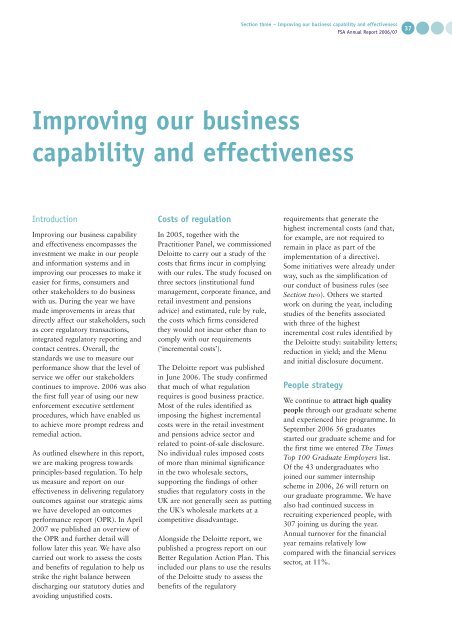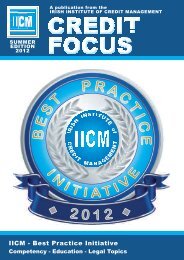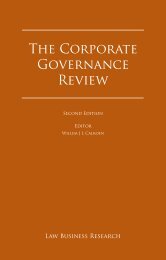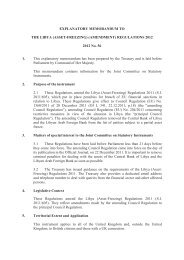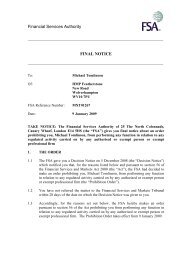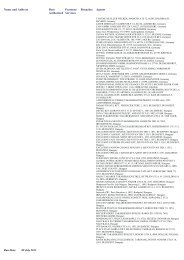FSA Annual Report 2006/07 - Better Regulation Ltd
FSA Annual Report 2006/07 - Better Regulation Ltd
FSA Annual Report 2006/07 - Better Regulation Ltd
You also want an ePaper? Increase the reach of your titles
YUMPU automatically turns print PDFs into web optimized ePapers that Google loves.
Section three – Improving our business capability and effectiveness<br />
<strong>FSA</strong> <strong>Annual</strong> <strong>Report</strong> <strong>2006</strong>/<strong>07</strong><br />
37<br />
Improving our business<br />
capability and effectiveness<br />
Introduction<br />
Improving our business capability<br />
and effectiveness encompasses the<br />
investment we make in our people<br />
and information systems and in<br />
improving our processes to make it<br />
easier for firms, consumers and<br />
other stakeholders to do business<br />
with us. During the year we have<br />
made improvements in areas that<br />
directly affect our stakeholders, such<br />
as core regulatory transactions,<br />
integrated regulatory reporting and<br />
contact centres. Overall, the<br />
standards we use to measure our<br />
performance show that the level of<br />
service we offer our stakeholders<br />
continues to improve. <strong>2006</strong> was also<br />
the first full year of using our new<br />
enforcement executive settlement<br />
procedures, which have enabled us<br />
to achieve more prompt redress and<br />
remedial action.<br />
As outlined elsewhere in this report,<br />
we are making progress towards<br />
principles-based regulation. To help<br />
us measure and report on our<br />
effectiveness in delivering regulatory<br />
outcomes against our strategic aims<br />
we have developed an outcomes<br />
performance report (OPR). In April<br />
20<strong>07</strong> we published an overview of<br />
the OPR and further detail will<br />
follow later this year. We have also<br />
carried out work to assess the costs<br />
and benefits of regulation to help us<br />
strike the right balance between<br />
discharging our statutory duties and<br />
avoiding unjustified costs.<br />
Costs of regulation<br />
In 2005, together with the<br />
Practitioner Panel, we commissioned<br />
Deloitte to carry out a study of the<br />
costs that firms incur in complying<br />
with our rules. The study focused on<br />
three sectors (institutional fund<br />
management, corporate finance, and<br />
retail investment and pensions<br />
advice) and estimated, rule by rule,<br />
the costs which firms considered<br />
they would not incur other than to<br />
comply with our requirements<br />
(‘incremental costs’).<br />
The Deloitte report was published<br />
in June <strong>2006</strong>. The study confirmed<br />
that much of what regulation<br />
requires is good business practice.<br />
Most of the rules identified as<br />
imposing the highest incremental<br />
costs were in the retail investment<br />
and pensions advice sector and<br />
related to point-of-sale disclosure.<br />
No individual rules imposed costs<br />
of more than minimal significance<br />
in the two wholesale sectors,<br />
supporting the findings of other<br />
studies that regulatory costs in the<br />
UK are not generally seen as putting<br />
the UK’s wholesale markets at a<br />
competitive disadvantage.<br />
Alongside the Deloitte report, we<br />
published a progress report on our<br />
<strong>Better</strong> <strong>Regulation</strong> Action Plan. This<br />
included our plans to use the results<br />
of the Deloitte study to assess the<br />
benefits of the regulatory<br />
requirements that generate the<br />
highest incremental costs (and that,<br />
for example, are not required to<br />
remain in place as part of the<br />
implementation of a directive).<br />
Some initiatives were already under<br />
way, such as the simplification of<br />
our conduct of business rules (see<br />
Section two). Others we started<br />
work on during the year, including<br />
studies of the benefits associated<br />
with three of the highest<br />
incremental cost rules identified by<br />
the Deloitte study: suitability letters;<br />
reduction in yield; and the Menu<br />
and initial disclosure document.<br />
People strategy<br />
We continue to attract high quality<br />
people through our graduate scheme<br />
and experienced hire programme. In<br />
September <strong>2006</strong> 56 graduates<br />
started our graduate scheme and for<br />
the first time we entered The Times<br />
Top 100 Graduate Employers list.<br />
Of the 43 undergraduates who<br />
joined our summer internship<br />
scheme in <strong>2006</strong>, 26 will return on<br />
our graduate programme. We have<br />
also had continued success in<br />
recruiting experienced people, with<br />
3<strong>07</strong> joining us during the year.<br />
<strong>Annual</strong> turnover for the financial<br />
year remains relatively low<br />
compared with the financial services<br />
sector, at 11%.


